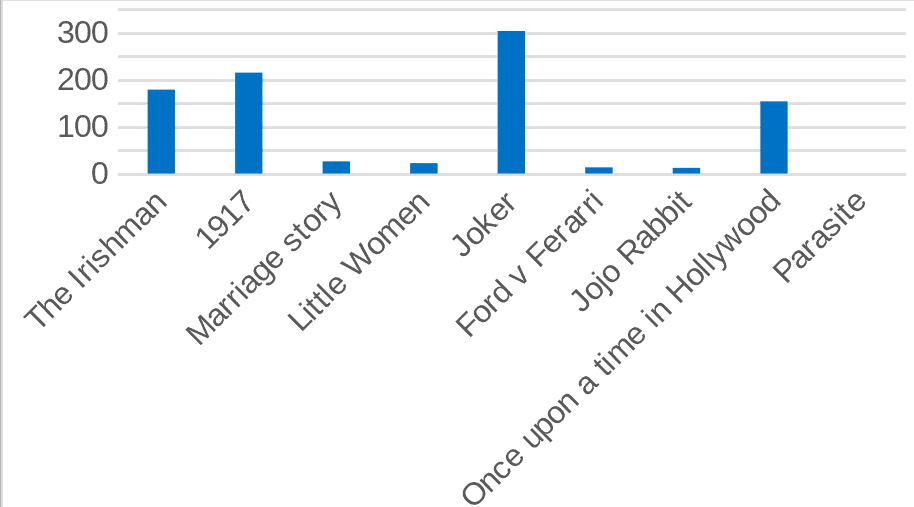Kaspersky: "The Joker" topped the list of movies most used by digital criminals to distribute malware.
Οι δημοφιλείς ταινίες κερδίζουν την προσοχή των ψηφιακών εγκληματιών, και όσο τα "Όσκαρ" πλησιάζουν η ενασχόλησή τους εκτοξεύεται. Για να κατανοήσουμε καλύτερα τον τρόπο με τον οποίο οι ψηφιακοί εγκληματίες προσπαθούν να εκμεταλλευτούν το ενδιαφέρον μας για ταινίες υψηλού προφίλ, οι ερευνητές της Kaspersky εξέτασαν την έκταση που παίρνουν τέτοιου είδους απάτες.

With more than 20 phishing sites and 925 malicious files crawled under the guise of this year's nominees, the findings show that those looking for a nice night in front of the screen watching a recent blockbuster should be on the lookout for such scams.
Η Kaspersky βρήκε πάνω από 20 ιστότοπους phishing και λογαριασμούς Twitter που προσέφεραν στους χρήστες την ευκαιρία να παρακολουθήσουν δωρεάν τις υποψήφιες ταινίες. Αυτοί οι ιστότοποι συγκεντρώνουν τα δεδομένα των χρηστών και τους παροτρύνουν να πραγματοποιήσουν ποικίλες εργασίες προκειμένου να αποκτήσουν πρόσβαση στην επιθυμητή ταινία. Αυτές μπορεί να ποικίλουν από τη διεξαγωγή έρευνας και την ανταλλαγή προσωπικών στοιχείων, μέχρι την εγκατάσταση adware ή ακόμα και την παραχώρηση λεπτομερειών της πιστωτικής τους cardς. Περιττό να πούμε ότι στο τέλος της διαδικασίας, ο χρήστης δεν παίρνει το περιεχόμενο.
Candidacyfor Best Picture Oscar
|
|
|
|
1 |
1917 |
|
2 |
Ford v Ferrari |
|
3 |
Jojo Rabbit |
|
4 |
Joker |
|
5 |
Little Women |
|
|
marriage story |
|
7 |
Once upon a time in Hollywood |
|
8 |
P |
|
9 |
The Irishman |
The Oscar nominations for Best Picture analyzed by its researchers Kaspersky
An example of a phishing site that collects credit card information


An example of a Twitter account promoting a phishing site
To further support the promotion of fraudulent websites, cybercriminals have also created Twitter accounts, where they distribute links to the content. Combined with malicious files spreading through different channels, this brings them successfully Results.
Τα κακόβουλα αρχεία που διαδίδονται στο διαδίκτυο ως αντίγραφα των υποψήφιων ταινιών, παρέχουν επίσης ένδειξη των επιπέδων ενδιαφέροντος προς τους υποψηφίους. Οι ερευνητές της Kaspersky συνέκριναν κακόβουλη δραστηριότητα υπό το όνομα των προτεινόμενων ταινιών κατά τις πρώτες τέσσερις εβδομάδες μετά τη δημόσια πρεμιέρα της ταινίας. Ως αποτέλεσμα, ο «Τζόκερ» κατέλαβε την πρώτη θέση μεταξύ των ταινιών που χρησιμοποιήθηκαν - ήταν η πιο δημοφιλής ταινία μεταξύ των εγκληματιών στον κυβερνοχώρο με 304 κακόβουλα αρχεία που πήραν το όνομα του κακού της Gotham. Το «1917» βρέθηκε στη δεύτερη θέση με 215 κακόβουλα αρχεία, ο Ιρλανδός στην Τρίτη με 179 αρχεία. Η κορεατική ταινία «Parasite» δεν είχε κακόβουλη δραστηριότητα που να σχετίζεται με αυτήν.
The number of malicious files detected by Kaspersky products under the guise of candidate films

Kaspersky also looked at whether there was a significant increase in malicious files shortly after the film's public release. This showed that most of the malicious files appeared in the third or fourth week after the film's release in cinemas, although some were distributed even before the premiere.

The number of malicious files detected by Kaspersky products
Kaspersky experts also analyzed whether the availability of a movie on a streaming platform affects the likelihood that users will search for its illegal copy on the Internet, comparing malicious activity after the initial release in limited theaters and actual release on Netflix.
Στην περίπτωση της «Ιστορίας Γάμου» δεν εντοπίστηκαν κακόβουλα προγράμματα πριν και μετά την αρχική κυκλοφορία της ταινίας στους κινηματογράφους. Ωστόσο, οι κυβερνοεγκληματίες άρχισαν να χρησιμοποιούν τον τίτλο της ταινίας μετά την κυκλοφορία της στο Netflix, αντανακλώντας το ενδιαφέρον που προήλθε απέναντι στην ταινία. Στην περίπτωση του πολυαναμενόμενου «Ιρλανδού», παρόλο που λιγότεροι χρήστες ασχολήθηκαν με την εξεύρεση αντιγράφου της ταινίας στο Διαδίκτυο, ήταν πιο αποφασισμένοι να το κάνουν - ο αριθμός των ανιχνεύσεων μετά την αρχική περιορισμένη κυκλοφορία της ταινίας στον κινηματογράφο ήταν μεγαλύτερος από ό, τι μετά την κυκλοφορία της στο Netflix.
"Cybercriminals are not bound by the exact dates of movie premieres, as they do not actually distribute any content other than malicious data. However, as they take advantage of trends, they depend on user demand and actual file availability. "To avoid falling victim to criminals, you only use legitimate platforms and subscriptions to ensure you can enjoy a nice night in front of the TV without worrying about any threats," said Anton Ivanov, a malicious software analyst at Kaspersky.
To avoid falling prey to malicious programs that pretend to be popular movies or TV shows, Kaspersky recommends that you follow these steps:
- Pay attention to official movie release dates in cinemas, streaming services, TV, DVDs or other sources.
- Do not click on suspicious links, such as those that promise to show a new movie before it is officially released.
- Check its extension archiveu that you have "downloaded". Even if you are going to "download" a video file from a source you consider trustworthy, the file should have an .avi, .mkv or .mp4 extension among other video formats, definitely not .exe.
- Ελέγξτε την αυθεντικότητα του ιστότοπου. Μην επισκέπτεστε ιστότοπους που σας επιτρέπουν να παρακολουθήσετε μια ταινία μέχρι να είστε βέβαιοι ότι είναι νόμιμοι και ότι ξεκινούν με το "https".
- Verify that the site is authentic by double-checking the format of the URL or the spelling of the company name, reading reviews about it, and checking the domain registration data before you start downloading.
- Use a reliable solution security





